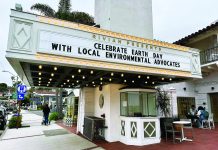Over a cup of coffee in Heisler Park last week, Charles “Cowboy” Conwell plucked a “holy” card from his wallet and presented it to Barbara McMurray, a Laguna Beach resident and homeless advocate.
The card was embellished with a Jesus-like figure pointing the way to a sailor struggling in high seas.
“It was one of the sweetest things, acknowledging that everyone faces gale force winds,” said McMurray, who felt humbled by receiving a gift of encouragement from someone who used a bench as a pillow and had lived mostly on the streets for the past two decades.
Last Saturday about 6:30 p.m., Conwell, 58, suffered fatal injuries after being struck by a minivan as he crossed Laguna Canyon Road outside of a marked crosswalk. He had apparently taken a bus to the ACT V parking lot and homeless shelter, where he was a regular, according to operators.
The 45-year-old driver, Michelle Massick of Mission Viejo, was not cited, though the incident is still under investigation, said police Lt. Jason Kravetz.
A memorial service is planned for Conwell at Main Beach at 9:30 a.m. this Saturday, Jan. 16, as well as a second service at 1 p.m. Sunday, Jan. 17, at the Neighborhood Congregational Church.
Conwell perhaps was best known as the town’s No. 1 recipient of citations for public drunkenness. Court records show 168 arrests for numerous minor offenses spanning 10 years. Even so, he stood out for his untrimmed full white beard and sartorial flair, ensembles that typically included boots, hat and designer-clothing discerningly chosen at thrift stores.
News of Conwell’s death was both heart-breaking and a relief to Sandra Roy, of Sykesville, Md., who last heard from her older sibling 15 years ago. “We had all resigned ourselves to thinking he had passed,” said Roy, who was comforted to learn her brother had befriended people who cared for him.
Conwell last spoke with his mother, Susie, when he needed money for glasses 15 years ago, Roy said. At the time, her brother was evasive about his whereabouts and his health.
As a teenager, Conwell left his hometown in Baltimore, hitchhiking to California to flee an alcoholic father, who worked in a brewery and regularly beat him with a belt, said Roy. “One of the beatings was because he had an African-American friend,” she recalled. Ten years younger than Charles, Roy said, “as a kid I was in awe of him, having adventures. He didn’t want to stay in one place too long.”
In his 20s, Conwell worked with horses in northern California or perhaps Colorado. He ended up in Laguna Beach by happenstance, house-sitting for someone, Roy thought.
Here, though, Conwell befriended Richard Jones, who became his partner in a business cutting precious stones for use in jewelry and furniture in the late 1980s. On a rare visit to his family, Conwell brought gifts, giving Roy a Brazilian aquamarine and his mother a ring. Roy still keeps a business card: Richard Jones Jeweled Fantasies, Laguna Beach. “He would just show up out of the blue,” she said, of her brother.
Conwell, though, went on a drinking binge after Jones died unexpectedly due to a brain aneurism, according to Pastor Bob Mohr, of Lake Elsinore, who for the past 13 years has spent each Saturday ministering to homeless people in Laguna Beach’s Heisler Park. “That’s what threw him out on the streets,” said Mohr.
By the time Conwell sobered up, Jones’ heirs had taken possession of the property, which included two homes on Glenneyre Street, said Mohr, recalling what little Conwell would tell him of his previous life. “He got very little out of it.”
“That was the end of him wanting to do anything,” said Mohr’s wife, Pam. “He was devastated. He never had the heart to do it on his own.”
Over 13 years, Conwell went through five or six alcohol treatment programs and lived sober for months with the Mohrs, but never lost his thirst.
“He couldn’t get past the alcohol,” said Tony Rogers, who manages the Laguna Relief and Resource Center, which provides showers and meals to the homeless. “He kept trying over and over again. It’s the hardest thing I’ve ever seen,” said Rogers, “living your whole life fighting what you want every single day.”
To advocates, who try to coax homeless people from the streets and direct them to services, Conwell’s situation served as a classic example on two levels. “Nobody figured out how to solve the problem,” said resident Keating Rhodes, citing his lengthy arrest record and the huge public costs through the criminal justice system.
Moreover, Conwell’s longevity in his adopted hometown is typical of homeless people, who generally remain where they became homeless, according to the National Law Center on Homelessness and Poverty.
Last summer, when homeless teens took advantage of the town’s expunged anti-camping statutes, Conwell went out of his way to talk to them, said Rev. Brian Hewitt, of Costa Mesa and MCN Ministries, who also spends time with homeless people in Laguna. “He gave them the words of wisdom that it wasn’t a cool lifestyle,” he said.
“He really came alive when they asked him questions,” added Colin Henderson, founder of the Friendship Shelter, describing Conwell’s interactions with young people. And though Conwell could not conquer his own demons, he never lost empathy for others, telling Henderson recently that he continued to miss his wife, Ellin, who died in 2006.
Conwell is survived by his mother, Susie, and brother Douglas, both of Baltimore; and sisters Sandra Roy and Rebecca Ibex, both of Maryland, and Constance Conwell, of Glendale, Calif. He was predeceased by a brother, Michael, and his father, Grover.





[…] the nearly eight-year period, nine collisions involved pedestrians, including two fatalities: the death of Charles “Cowboy” Conwell, struck while crossing the road near ACT V in 2010, and that of […]